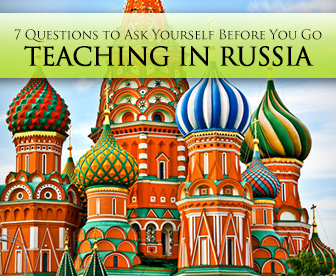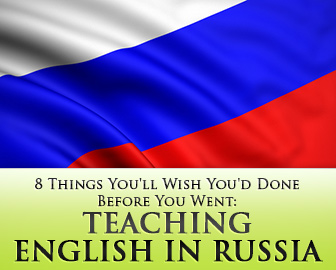Is Teaching in Russia Right for You? 7 Questions to Ask Yourself Before You Go


Technically, all you need to do now is pack, but there’s a few extra things you’ll really wish you’d done once you’re ensconced in your Moscow apartment and wondering how on earth you’ll get to work the next day. If you haven’t already done all of these, it might be a great idea to start.

The demand for English language teaching is exploding in Russia, with language schools springing up everywhere in response. Some of these are highly respectable institutions that have been running for years, others are microscopic start-ups, often with equally microscopic budgets, a few are complete cowboys and, of course, there’s a vast middle ground. Don’t jump on the first school that offers you a job - find out what you can about it online
Just because a school is reputable doesn’t necessarily mean that it will suit you. Somebody from a business background with a terror of small children might get on wonderfully in a school that caters to adults but not have any fun at all at one that mostly acts as a language school / babysitting service for 6 to 10 year olds.
In some countries, language schools don’t always bother to interview prospective teachers by phone, but Russia is one of the countries where they usually do. If they don’t, it might be a warning sign of a school that doesn’t really know what it is doing. Whether or not the school requests it, always ask for a phone interview, which lets you get an idea of the company and the people that work there – the interview process works both ways.
You’re really going to struggle if you can’t read signs and it would add to the general feeling of disorientation that is inevitable when moving to a foreign country. I arrived in Moscow with virtually no Russian, which I don’t recommend, but I’d already learned the Cyrillic alphabet for a trip to Bulgaria (completely different language, same alphabet) and it definitely helped with mundane things like navigating the metro. Learning a new alphabet, especially one that’s very similar to the English alphabet anyway, is a matter of one evening spent memorising it and that’s it.
You might be able to get by with a smattering of phrasebook Russian for the first couple of weeks. In the big cities, you might be able to get by with NO Russian, and some people do, although it isn’t very polite and you wonder what sort of experience they’ll have. You’ll have a smoother time adjusting, though, and find socialising a lot easier if you learn some of the language before you go. It isn’t easy on your own, so you’ll thank yourself later if you take some lessons.
Russian classes aren’t the only option. If you live in a university town, you might find a Russian student happy to do a language swap – i.e. you help her/him with English for half the time and s/he helps you with Russian for the rest. Alternatively, consider hiring a teacher online to teach through Skype.
While in the research/interview process, ask for contact details of past and present teachers and email them. They might give you a much better idea of the school in question than whoever is interviewing you. Note that the school probably won’t give you email addresses of teachers who left in a storm cloud, so you aren’t going to get the really juicy stuff, but you should develop a good idea of whether this would be a good place for you to work. If nothing else, you’ll get some handy hints on where to have your lunch.
I started teaching in Russia after years of teaching English elsewhere, and it helps. You might be qualified up to the eyeballs, but if the only actual teaching experience you have was on your CELTA course, you’re throwing yourself in at the deep end. Dealing with a new country, new culture and new language is plenty to be getting on with. You don’t need to be starting a completely new job as well, and Russian students might not be the easiest for a box-fresh teacher – they appreciate experience as well as expertise. Teach a few EFL/ESL classes on a volunteer basis before you go and that first class will be far less terrifying.
This one caught out a few teachers as this is a country where an emphasis is placed on the technicalities of a foreign language. If you don’t know the English language inside out, consciously as well as intuitively (everybody knows their own language intuitively, which does not mean they can teach it) and, crucially, can explain it, you’ll have problems.
If you have any blind spots (for example the passive voice or unreal conditionals), work through them in your head until you completely understand them and could explain the working to anybody. Your students will ask questions and, at the higher levels, probably have a far better conscious understanding of English grammar than your average American, Canadian or Brit.
Tourists rush around seeing everything, but once you’re living and working in a country, it is easy to leave everything until next weekend, or perhaps your next vacation … actually make it the one after that. Before you know it, you’ve spent two years in Russia and seen less than the backpacker who flew into Moscow two weeks ago. In my case, I was fortunate enough to be dragged around the Top Ten Must Sees of Moscow by another teacher, and it was thoroughly worthwhile. Otherwise, it is quite likely, I’d have made a total of one trip to Gorky Park and another to Red Square in the first week, and that would have been it. I was brought up in Scotland and I still haven’t seen not only the Loch Ness monster, which is kind of to be expected, but I haven’t even seen Loch Ness. I’d quite like to, and it would just be a weekend or even a day trip, just not one I or any of my friends has ever got around to doing.
Russia is packed with amazing sights and it’s a huge country. If you don’t prioritise the things you’re most keen to see, you might never get to them. The time to make a list of things you want to see and do is before you go, because once you’re there, you’ll probably be too busy planning lessons, seeing friends and getting on with the nitty gritty of daily life to do all the tourist things. Have a list and you might remember why you were so keen to work here. You may even actually do them.
Tell us about your experience in the comments below, we'd love to hear from you!